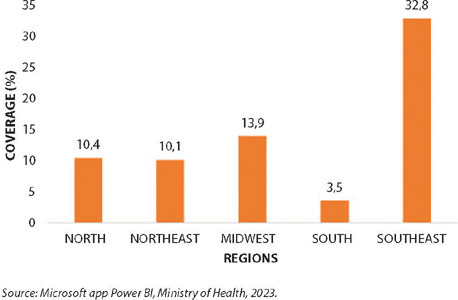-
ORIGINAL ARTICLE
Analysis of the vaccination situation against Mpox in people living with HIV/AIDS: an ecological study
Revista Brasileira de Enfermagem. 2024;77(5):e20230234
10-25-2024
Abstract
ORIGINAL ARTICLEAnalysis of the vaccination situation against Mpox in people living with HIV/AIDS: an ecological study
Revista Brasileira de Enfermagem. 2024;77(5):e20230234
10-25-2024DOI 10.1590/0034-7167-2023-0234
Views0See moreABSTRACT
Objectives:
to analyze the vaccination situation against Mpox in people living with HIV/AIDS in Brazil.
Methods:
an ecological study on the vaccination status against Mpox in people living with HIV/AIDS (PLWHA) in Brazil. The data were collected in April 2023 through information from the Ministry of Health, using the “Microsoft app Power BI,” which is publicly accessible.
Results:
the data analysis revealed that in Brazil, 2,978 doses of the MVA-BN Jynneos Mpox vaccine were administered in PLWHA, resulting in a vaccination coverage of 18.3%, with the southern and southeastern regions showing the lowest and highest vaccination coverage, respectively. Gender-based evaluation showed a higher proportion of vaccinated males.
Conclusions:
we identified low vaccination coverage in all regions of Brazil, highlighting the need for intensified vaccination activities, especially for PLWHA.

-
EXPERIENCE REPORT
Feedback on research results to healthcare professionals in the context of HIV
Revista Brasileira de Enfermagem. 2019;72(5):1416-1420
09-16-2019
Abstract
EXPERIENCE REPORTFeedback on research results to healthcare professionals in the context of HIV
Revista Brasileira de Enfermagem. 2019;72(5):1416-1420
09-16-2019DOI 10.1590/0034-7167-2017-0875
Views0See moreABSTRACT
Objective:
Reporting the feedback on the results of a multicenter research for healthcare professionals that attend people living with HIV and AIDS in a Specialized Healthcare Center at Belém, state of Pará, Brazil.
Method:
Case report of the presentation and interpretation of research results, in 2015, totaling 25 participating professionals. The visual resource used was a data projector.
Results:
Participants reported the importance of the initiative, since, even though it is their right, feedback on research results is uncommon. Among the discussed issues, emerged the need for a culturally appropriate device for adequately strengthening educational practices carried out by healthcare professionals.
Conclusion:
Feedback on the research results enabled exchange of knowledge about the findings and production of new knowledge. In addition to achieving the social and ethical commitment of research, by promoting dissemination of results, enabling reflections on the reality in which they work.
-
RESEARCH
Perception of nurses who perform rapid tests in Health Centers
Revista Brasileira de Enfermagem. 2018;71:631-636
01-01-2018
Abstract
RESEARCHPerception of nurses who perform rapid tests in Health Centers
Revista Brasileira de Enfermagem. 2018;71:631-636
01-01-2018DOI 10.1590/0034-7167-2017-0298
Views0See moreABSTRACT
Objective:
Learn about the perception of health professionals who perform rapid tests in Health Centers (HCs).
Method:
This is a descriptive and qualitative study conducted in nine HCs in Recife. Data were collected through individual interviews and evaluated using Bardin’s content analysis, in its thematic category.
Results:
Challenges were observed in rapid tests related to the supply of products, physical structure, training for pre- and post-test counseling, and the need for improvements in permanent education actions.
Final considerations:
These issues can be resolved with management improvements, systematization of permanent education activities, and definition of care flows that enable early diagnosis. Besides the diagnosis, care lines should be created for people living with HIV and AIDS who use the HCs for early health care process.



